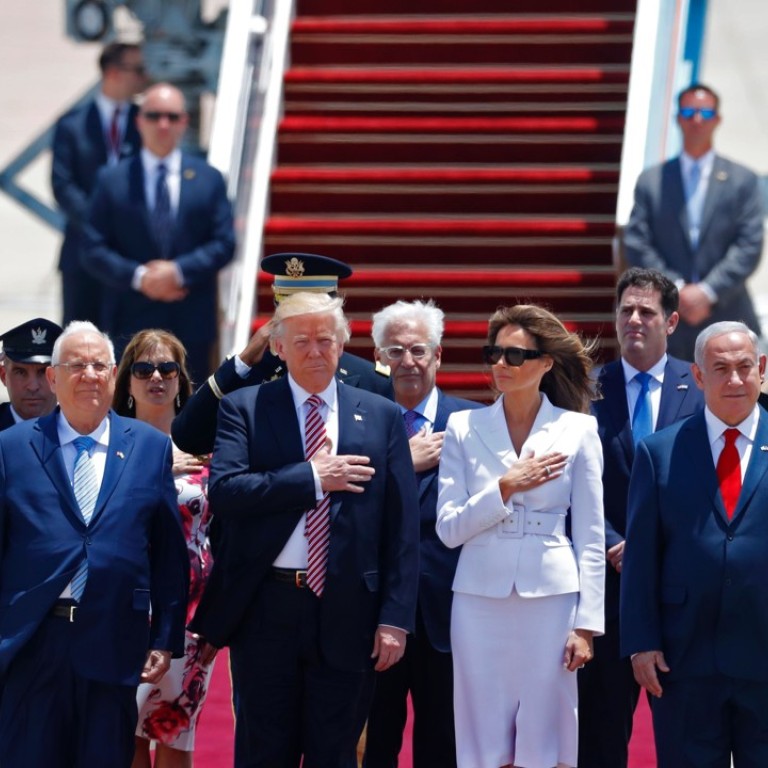
Dealmaker Trump launches salvo against Iran as he seeks ‘ultimate’ Middle East peace deal
Donald Trump’s journey has quickly plunged him into the fraught and complex politics of the Middle East
US President Donald Trump opened his first visit to Israel on Monday, saying he sees growing recognition among Muslim nations that they share a “common cause” with Israel in their determination to counter the threats posed by Iran.
Trump also became the first sitting US president to visit the Western Wall in the disputed city of Jerusalem, placing his hand on one of the most sacred sites in Judaism.
The Western Wall is the holiest site where Jews can pray. Trump, wearing a black skullcap, paused in front of it, then placed what appeared to be a written prayer or note between its stones, as is custom.
Arriving directly from Riyadh, Saudi Arabia, Trump expressed his hope for cooperation among US allies in the Middle East. His second stop on the nine-day tour aimed to test the waters for reviving the dormant Israeli-Palestinian peace process.
Trump, who had previously suggested that it would be easier than anticipated to solve the conflict that has vexed his predecessors for decades, said that conditions were right in both Israel and the Arab world to strike what he has called “the ultimate deal”.
“We have before us a rare opportunity to bring security and stability and peace to this region and to its people,” Trump said upon arrival in Tel Aviv.
Watch: Trump speaks of peace after arriving in Israel
Israeli Prime Minister Benjamin Netanyahu called Trump “a true friend” to Israel and expressed optimism about the president’s role in the Middle East peace process. But obstacles have emerged that may complicate the relationship between the White House and the Knesset.
Trump’s first stop was a meeting in Jerusalem with Israeli President Reuven Rivlin.
Trump said that Iran must never be allowed to have nuclear weapons while also denouncing Tehran’s support for “terrorists”.
“Most importantly the United States and Israel can declare with one voice that Iran must never be allowed to possess a nuclear weapon – never ever – and must cease its deadly funding, training and equipping of terrorists and militias,” Trump said in remarks at Israeli President Reuven Rivlin’s residence. “And it must cease immediately.”
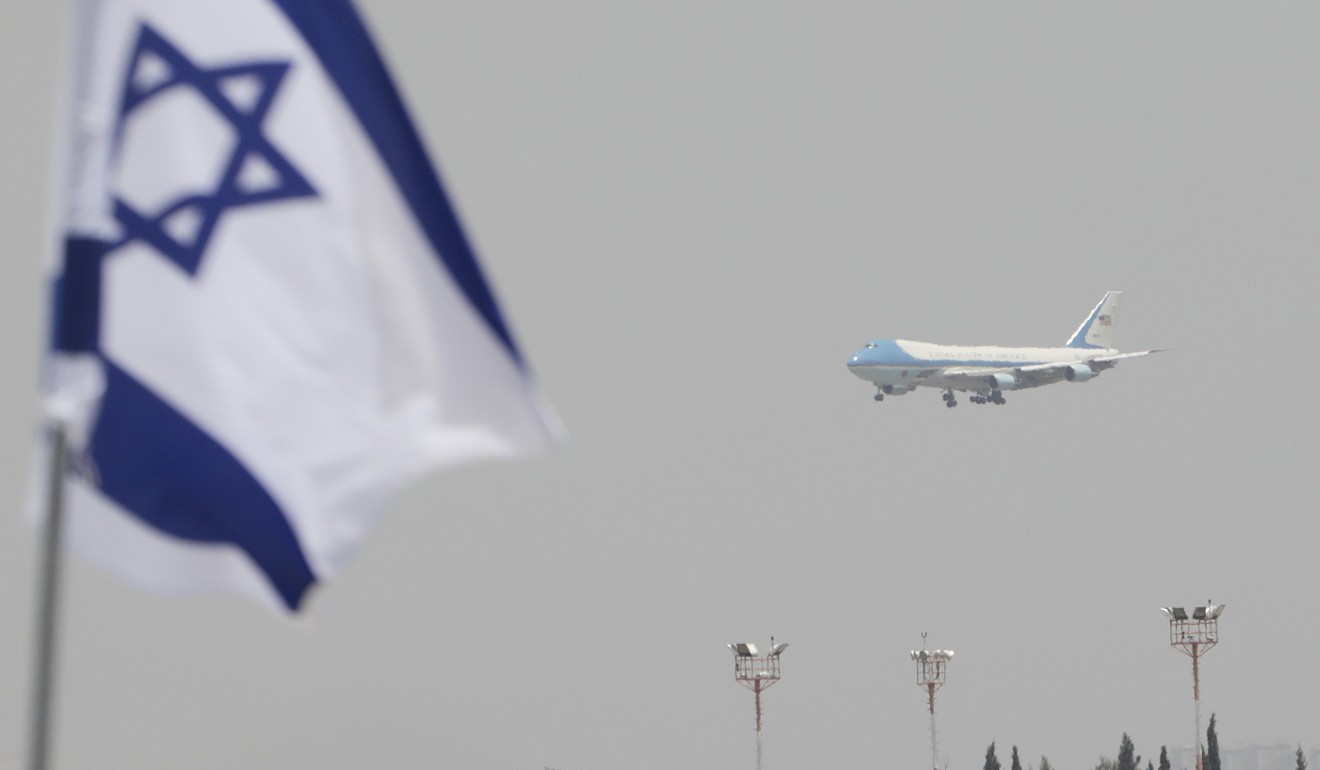
While in Saudi Arabia, Trump accused Iran of fuelling “the fires of sectarian conflict and terror” while calling for its international isolation.
But Trump may face concerns from Israelis over the new US$110 billion arms deal he announced during his previous stop in Saudi Arabia as well as questions from Israeli officials about revelations that he disclosed sensitive Israeli intelligence to Russian officials.
US Secretary of State Rex Tillerson, speaking to reporters on-board Air Force One, said the US could provide clarifications to Israel about the disclosure but said: “I don’t know that there’s anything to apologise for.”
White House aides have also tried to play down expectations for significant progress on the peace process during Trump’s stop, casting the visit as symbolic. Tillerson referred to the visit as “a moment in time” and suggested that the US would take a more active role in the future in brokering a deal if both sides make serious commitments.
Asked about a three-way meeting between Trump and the Israeli and Palestinian leaders, Tillerson said: “That’s for a future discussion.”
Israel’s security cabinet passed a package of economic measures late Sunday aimed at bolstering the Palestinian economy as a confidence-building gesture ahead of the Trump visit. They include easing travel for Palestinians between the West Bank and Jordan, developing two new industrial zones and increasing the number of building permits issued to Palestinians in parts of the West Bank where Jewish settlements are located amid Arab communities.
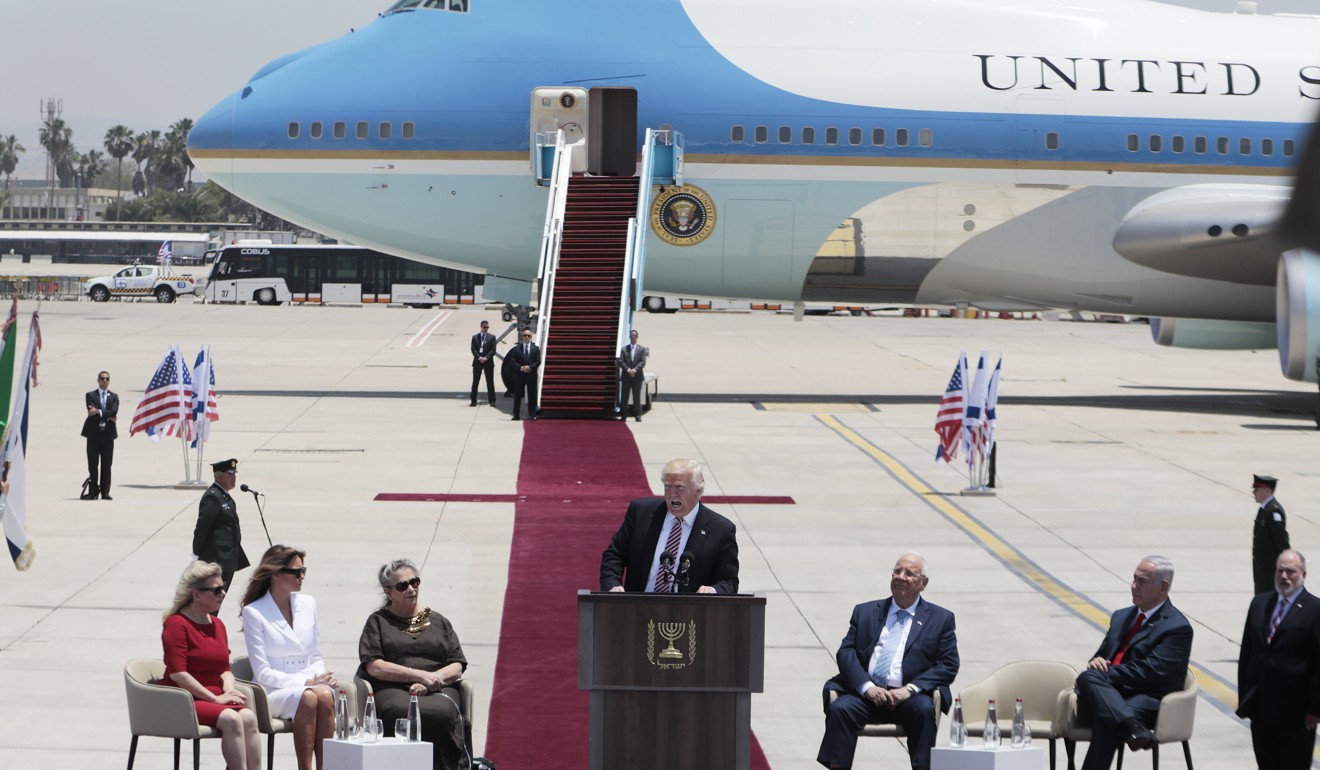
“The Trump administration is focused on materially enhancing the quality of life and the economy for the Palestinians,” said Michael Oren, a parliament member and former Israeli ambassador to the US, who now serves as an adviser at the prime minister’s office.
“They don’t see economic peace as a substitute for real peace, but they see it as setting an agenda that would make conditions conducive toward peace.”
The visit is expected to finally offer insight into the administration’s plans for the peace process after the last round of direct negotiations between Israel and the Palestinians collapsed in 2014. After a campaign filled with stridently pro-Israel statements and a pledge to move the US embassy from Tel Aviv to Jerusalem, Trump has moderated his Israel support since taking office, urging Netanyahu to limit settlement construction. The president has also decided not to immediately move the US embassy in Israel to Jerusalem, a senior White House official said this month.
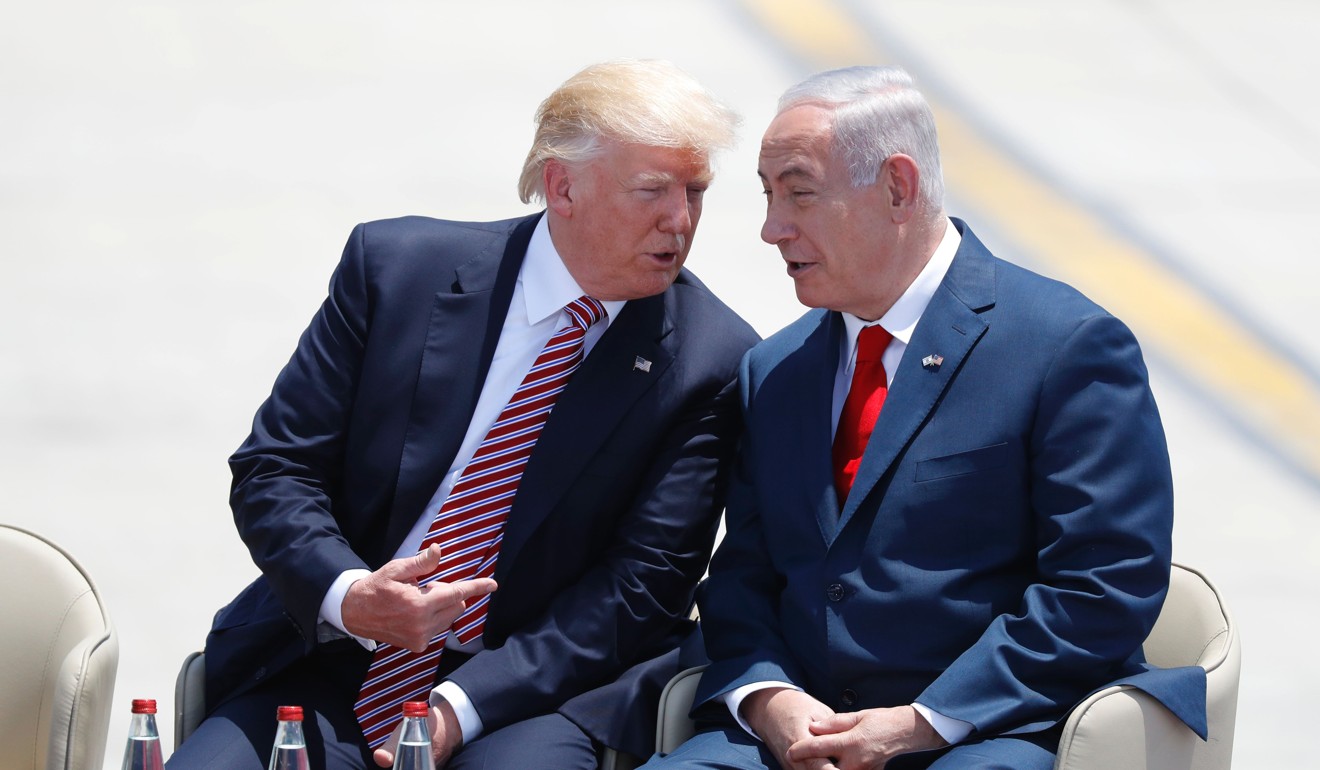
In the West Bank, hundreds of demonstrators supporting a hunger strike by Palestinian security prisoners in Israel, holding signs showing Trump’s face and a “Do Not Enter” symbol, clashed with Israeli forces. No injuries were immediately reported.
While public statements on the peace process and the status of Jerusalem may dominate headlines, behind the scenes Israeli Prime Minister Benjamin Netanyahu will ask the US president to impose new sanctions on Iran for threatening the Jewish state with ballistic missiles and sponsoring terrorism, Oren said.
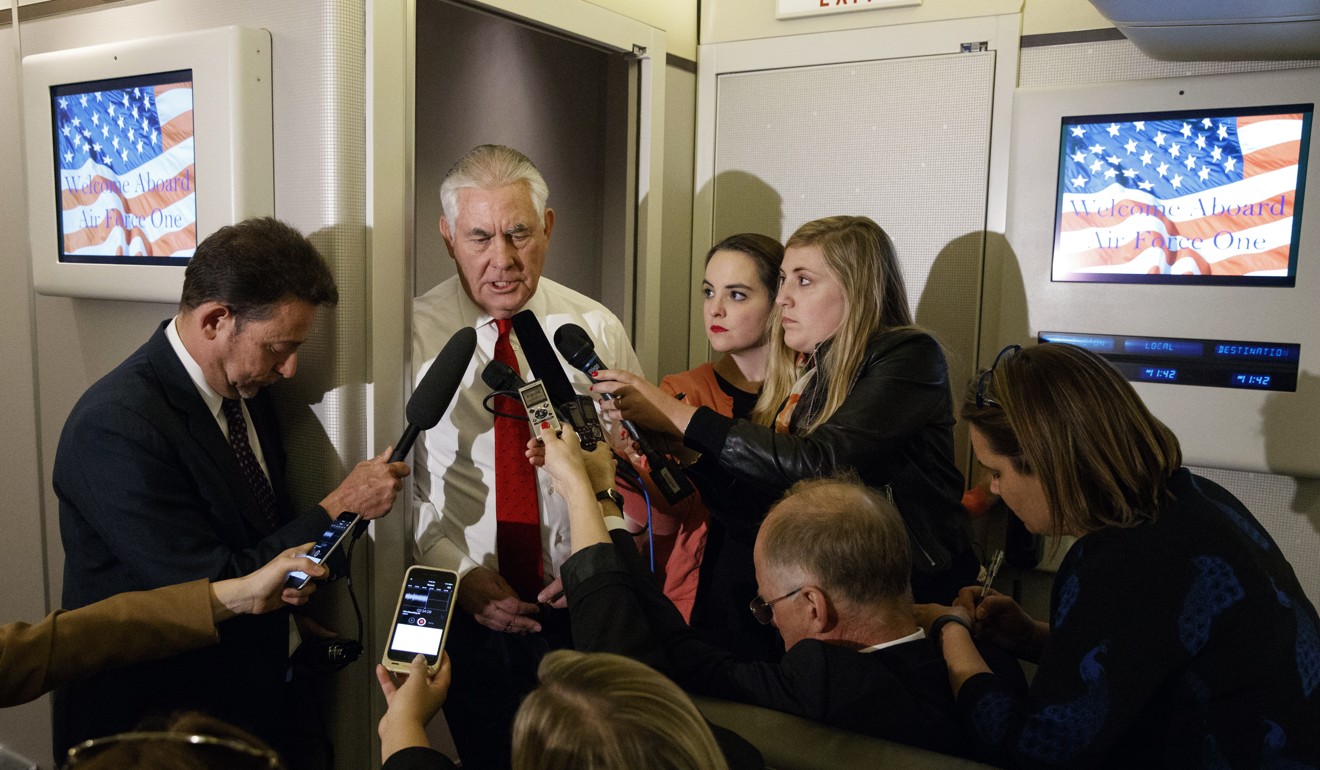
On Tuesday, Trump will cross for a few hours into Palestinian-held territory in Bethlehem, where he will meet Palestinian Authority President Mahmoud Abbas. Back in Israel, he’ll briefly tour the Yad Vashem Holocaust memorial and deliver a speech at the Israel Museum – expected to be his longest public remarks during the visit - before departing for the Vatican.
In Bethlehem, Abbas is scheduled to greet Trump with a bagpipe-playing colour guard and assure him that his people want peace. Palestinian groups across the political spectrum, including members of Abbas’s Fatah party, have called for a “Day of Rage” in support of the hunger strikers, but Palestinian security officers will be out in force to make sure the president isn’t harmed, Abbas’s office said.
More than 10,000 police officers, border police, special patrol units and undercover units have been deployed across Israel to secure the visit, closing major highways and causing disruptions to daily life.
Associated Press, Bloomberg, Reuters, Agence France-Presse
